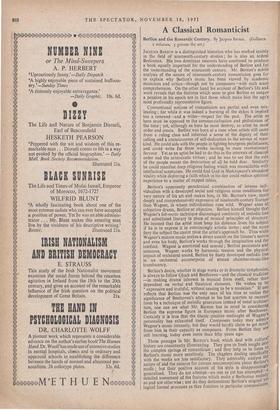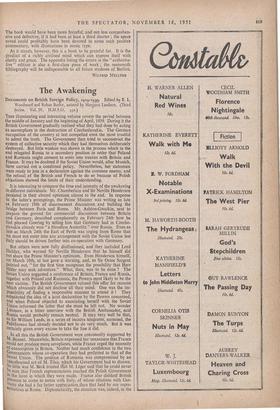A Classical Romanticist
Berlioz and the Romantic Century. By Jacques Barzun. (Gol(ancz. 2 volumes. 3 guineas the set.) JACQUES BARIUM is a distinguished historian who has worked mainly in the field of nineteenth-century studies ; he is also an ardent Berliozian. His two dominant interests have combined to produce a book equally important for the understanding of Berlioz and for the understanding of the nineteenth century. Mr. Barzun's subtle analysis of the nature of nineteenth-century romanticism goes far to explain why Berlioz's music has been viewed by academic musicians and critics—though not by composers—with such scant comprehension. On the other hand his account of Berlioz's life and work reveals that the features which seem to give Berlioz so unique a position in his epoch are in fact those which make him the age's most profoundly representative figure.
Conventional notions of romanticism are partial and even mis- leading; for while it was indeed a bursting of the dykes it implied too a renewed—and a wider—respect for the past. The artist as hero must be opposed to the commercialisation and philistinism of the time ; yet, although as hero be must destroy, as artist he must' order and create. Berlioz was born at a time when artists still came from a ruling class and inherited a sense of the dignity of their calling and a consciousness of self-dedication to the service of man- kind. He could side with the people in fighting bourgeois philistinism, and could write for them works inciting to mass revolutionary fervour. Yet as an artist he had to do this in the interests of classical order and the aristocratic virtues ; and he was to see that the rule of the people meant the destruction of all he held dear. Similarly he could manifest deep religious feeling which was reconcilable with intellectual scepticism. He could find God in Shakespeare's abundant vitality while deploring a faith which in his day could reduce spiritual experience to a matter of rapped tables.
Berlioz's apparently paradoxical combination of intense indi- vidualism with a developed social and religious sense conditions the very nature of his art and makes him, in Mr. Barzun's view, more deeply and comprehensively expressive of nineteenth-century Europe than Wagner, in whom individualism runs wild. Wagner aims at subjective drama, Berlioz at objective. Berlioz himself thought that Wagner's leit-motiv technique discouraged continuity of melodic line' and substituted literary in place of musical principles of structure.. He insisted that the artist must keep his distance from his subject if he is to express it in convincingly artistic terms ; and the more fiery the subject the cooler must the artist's approach be. Thus while Wagner's mature music makes a direct assault on the listener's nerves and even his body, Berlioz's works through the imagination and the intellect. Wagner is emotional and sensual ; Berlioz passionate and sensuous. Wagner works by harmonic tension and the physical impact of orchestral sound, Berlioz by finely developed melodic line in an orchestral counterpoint of almost chamber-music-like translucency.
Berlioz's desire, whether in stage works or in dramatic symphonies, is always to follow Gluck and Beethoven—and the classical tradition —in making drama inherent in musical form itself, rather than dependent on verbal and theatrical elements. He wishes to be "expressive and truthful, without ceasing to be a musician." If one reflects that Berlioz was the only man of his time to realise the significance of Beethoven's attempt in his last quartets to recreate form by a technique of melodic generation instead of tonal architec- ture, one can see what Mr. Barzun has in mind in considering Berlioz the supreme figure in European music after Beethoven. Certainly it is true that the titanic creative onslaught of Wagner's personality has exhausted itself. Composers today may admire Wagner's music intensely, but they would hardly claim to get much from him in their capacity as composers. From Berlioz they are still learning, today even more than fifty years ago. Those passages in Mr. Barzun's book which deal with cultural history are consistently illuminating. They give us fresh insight into , the complex springs of romanticism ; and they help us to listen to-, Berlioz's music more sensitively. The chapters dealing specificallY • with the works are less satisfactory. They admirably analyse tit.° nature of and the reasons for current misconceptions about Berlioz. s music ; but their positive account of his style is disappointingtY generalised. They do not attempt—no one as yet has attempted---:a detailed assessment of the features which make a Berliozian melody so and not otherwise ; nor do they demonstrate Berlioz's original Yes'. logical formal processes as they function in particular composition
The book would have been more forceful, and not less comprehen- sive and definitive, if it had been at least a third shorter ; the space saved could profitably have been devoted to some such positive commentary, with illustrations in music type.
As it stands, however, this is a book to be grateful for. It is the product of a richly civilised mind which can express itself with clarity and grace. The appendix listing the errors in the " authorita- tive" edition is also a first-class piece of work ; the mammoth bibliography will be indispensable to all future students of Berlioz.
W1LFRID MELLERS















































































 Previous page
Previous page